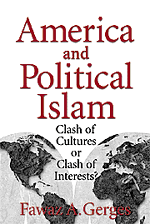Book contents
- Frontmatter
- Contents
- Acknowledgments
- 1 Framing American Foreign Policy
- 2 The Intellectual Context of American Foreign Policy
- 3 Islam and Muslims in the Mind of America
- 4 The Carter, Reagan, and Bush Administrations' Approach to Islamists
- 5 The Clinton Administration: Co-opting Political Islam
- 6 The Islamic Republic of Iran
- 7 Algeria
- 8 Egypt
- 9 Turkey
- 10 Conclusion
- References
- Index
1 - Framing American Foreign Policy
Published online by Cambridge University Press: 05 June 2012
- Frontmatter
- Contents
- Acknowledgments
- 1 Framing American Foreign Policy
- 2 The Intellectual Context of American Foreign Policy
- 3 Islam and Muslims in the Mind of America
- 4 The Carter, Reagan, and Bush Administrations' Approach to Islamists
- 5 The Clinton Administration: Co-opting Political Islam
- 6 The Islamic Republic of Iran
- 7 Algeria
- 8 Egypt
- 9 Turkey
- 10 Conclusion
- References
- Index
Summary
This book examines the making of U.S. foreign policy toward Islamists from Carter to Clinton. It focuses on the U.S. foreign-policy elite's thinking toward Islamist states and movements. This elite includes the executive branch – the presidents and their closest advisers – and the national security bureaucracies of the executive office, as well as domestic politics, particularly opinion makers and pressure groups. The multiplicity of domestic influences has the capability of simultaneously pulling U.S. policy in opposing directions. These influences include public opinion, media, private interest groups, policy-oriented academic programs and think tanks, Congress, and other institutional sources. American foreign policy is a product of the whole spectrum of domestic political realities.
This book seeks to map the public pronouncements and some private musings of the U.S foreign-policy elite on Islamic revivalism in order to illuminate the various administrations' positions and reveal the continuities and variations in American policy. Careful comparisons of public rhetoric with private statements reveal recurrent themes, values, and resonant notions that are critical to any understanding of the formulation and practical conduct of U.S. Islam policy.
This study farther analyzes actual U.S. policies. The analytical challenge is to assess the complex relationship between ideas and action, to see if the rhetoric or stance of various U.S. administrations serves as a reliable guide to comprehending their policies and if tensions persist between policy makers' words and deeds. Such a research strategy takes the level-of-analysis problem seriously by clearly distinguishing the level of rhetoric (discourse) from the level of policy (action).
- Type
- Chapter
- Information
- America and Political IslamClash of Cultures or Clash of Interests?, pp. 1 - 19Publisher: Cambridge University PressPrint publication year: 1999



